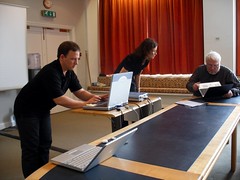June 13, 2007
The Green Datacentre Cannot Hold
 Nature writes about a UK program to replace 'wasteful' home computers with efficient thin clients. Instead of running a heavy processor that is often not used fully a "green PC" with minimal hardware simply acts as a terminal to a datacenter somewhere. The wheel or reincarnation rolls onwards (I think I saw two full cycles of this back at KTH while I was there).
Nature writes about a UK program to replace 'wasteful' home computers with efficient thin clients. Instead of running a heavy processor that is often not used fully a "green PC" with minimal hardware simply acts as a terminal to a datacenter somewhere. The wheel or reincarnation rolls onwards (I think I saw two full cycles of this back at KTH while I was there).
I can se a long list of problems with this scheme. Some of the environmental claims sound clearly overblown, such as a 98% reduction of energy consumption. The main problem is of course centralisation. It is not only a matter of trust that the central server and its employees will handle your personal files right but that the software will also be locked in by the central power. I will no doubt save on updates and provide what most people want, but it assumes that users do not need any individual applications (allowing them to run apps of their own on the servers is to invite a hacking disaster). I get the feeling it is all very useful for novice or occasional users, but not people who actually do something more complex or specialised with their computers, be it graphics, programming or gaming.
I guess the key question will be: will the thin clients restrict the ability to view online pornography in any way? If they do, I think the program will fail. Not because online pornography is essential to people, but because they will react negatively to all forms of apparent censorship of their surfing habits. The desire to watch pornography is likely such that users would repeatedly notice the restrictions (if any) and become irritated. If they do not restrict websurfing, voices will no doubt be heard that the government shouldn't pay for porn. It is a lose-lose situation.
The clients will also be highly dependent on their net connection. If it fails, they will not work - a standalone computer can still be used for most applications. Adding to the broadband infrastructure might be a carbon-virtuous act, but it would be a pretty big extra cost and everybody would be very keen on foisting it onto the government.
I don't think the future lies in centralised computing. The hub is too vulnerable, to stiff and easily overloaded. We should aim more for the same efficiencies of power we see in modern cellphones instead. Shrink the computers, move them into the ipods and set up more wireless instead. That way people will not buy the monster machines we power-addicts need to run neural networks, Photoshop or games. We do not need another Minitel.
Posted by Anders3 at June 13, 2007 07:45 PM